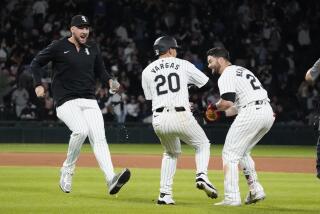BASEBALL : The Chicago Story to Have a New Author
- Share via
In the final hours of Comiskey Park, before baseball is replaced by the wrecking ball, the Chicago White Sox continue to work on a new foundation for their new home.
In the aftermath of their 92 losses and seventh-place finish last year, the White Sox entered this next-to-last weekend of the regular season with the second-best record in baseball--and the second-best in the American League West.
Were they in any other division except the one dominated by the Oakland Athletics, the White Sox might be about to celebrate their remarkable reversal with a shower of champagne.
“From an overall perspective, we have to be pleased with the tremendous strides we’ve made,” Manager Jeff Torborg said. “I’m proud of that, but it’s frustrating we couldn’t have done more.
“People tend to forget who finished second, though I don’t think we will.”
The Chicago comeback is one of the most unusual stories of an unusual season, but it took on added dimension last week when co-owner Jerry Reinsdorf and general manager Larry Himes agreed that Himes, the architect of the White Sox renaissance, would not be moving with the team to the new stadium across 35th Street.
Agreed?
A nice way to say that Himes, the former Angel scouting director who may replace Jack McKeon as the San Diego Padres’ general manager, was forced out by Reinsdorf.
Why? Reinsdorf said only that Himes had done a fine job taking the White Sox from point C to point B but didn’t think he was the man to take them to point A. Beyond that, there was no clear explanation, only speculation, including:
--Reinsdorf was displeased by Himes’ refusal to mortgage some of the White Sox future in a stretch trade for Houston Astros pitcher Mike Scott and displeased again that Himes didn’t claim Harold Baines and Willie McGee, preventing them from joining the A’s.
--Although Himes had not publicly questioned the approach of batting instructor Walt Hrniak, who is operating on a five year-contract as one of Reinsdorf’s personal favorites, some of his organizational people were unhappy about the appointment of Hrniak clones at each minor league level, and the negative groundswell was interpreted as coming from Himes.
--There was also the simple matter of a personality clash compounded by Reinsdorf’s reported feeling that Himes was privately taking too much credit for the White Sox’s success, at the expense of Torborg and the players.
Himes is likely to receive the executive-of-the-year award for his work with a club that fired him.
In unraveling the mess he inherited from Ken Harrelson in 1986, Himes ferreted out Harrelson’s minor league cronies and rebuilt the scouting system to the point that all four of his No. 1 draft choices have contributed to the 1990 success. They are Pitcher Jack McDowell (1987), third baseman Robin Ventura (1988), first baseman Frank Thomas (1989) and pitcher Alex Fernandez (1990).
Himes also orchestrated trades for starting pitchers Greg Hibbard, Eric King and Melido Perez, relievers Barry Jones and Ken Patterson, second baseman Scott Fletcher and outfielders Sammy Sosa, Dan Pasqua, Lance Johnson and Phil Bradley.
Not one traded player has come back to haunt the White Sox.
“You look at the end of the 1986 season and what was going on, and you look at where that club is today, the difference is day and night,” Himes said. “I’m happy with my contribution. Continuity of management is a key to success. Change is always a setback.”
Torborg, who was hired by Himes and received a contract extension on the day Himes was dismissed, applauded the job Himes has done but added: “I have my own job to do, and I can’t let it affect me. Those are administrative decisions that happen frequently in baseball.”
The White Sox have a chance to reverse their 69-92 record of last year, and Torborg disputes the cynical contention that it’s a fluke, the result of a few players having their best years. Torborg said he would like to know who those few are.
“Bobby Thigpen (with a major league-record 51 saves) is having a sensational season, but you look at the stats and wonder how we’re within 25 games of Oakland, let alone nine or 10,” Torborg said. “You look at the top 10 and you don’t find any of our people. We have a lot of guys playing team baseball and maturing on the job, a lot of guys who figure to get better.
“I can sit here and dream about being in another division, but that’s not the way it is. We have to keep improving, and we’re a long way from being an outstanding club on the level of the A’s.
“At the same time, we’re the youngest club in baseball. We have a lot of guys who’ve never played September before, but they haven’t backed down. Every time they’ve been counted out, they come back. We’ve played Oakland tough. We haven’t been intimidated.”
The White Sox are the only team to win a season series from the A’s, going 8-5 overall and 5-1 in Oakland.
With a little help, they might have been second to none. As pitcher McDowell noted, “We played the A’s well, but nobody else did.”
It has been rumored that A’s Manager Tony LaRussa will return to Chicago as general manager, but LaRussa emphatically denies it. Joe Nossek, who has served the White Sox as a scout, eye in the sky and minor league manager, is expected to become personnel director, with Dan Evans continuing to handle paperwork.
Winning isn’t necessarily a healthy habit with the White Sox. The last time Chicago finished above .500--85-77--was in 1985, and then-general manager Roland Hemond, who also was in charge when the White Sox won 99 games and a division title in 1983, was rewarded by being fired. Hemond now runs the Baltimore Orioles.
Roger Clemens rejoins the Boston Red Sox rotation today, pitching against the New York Yankees. His shoulder is said to be healthy, but his team’s back appears to be bent by the heavy burden of history, the ghosts of Septembers past.
The Red Sox led the Toronto Blue Jays in the American League East by six games on Sept. 4. They entered the weekend series against the Yankees trailing the Blue Jays by a game. Since the start of division play in 1969, only one team has blown a late lead as large as six games--the 1978 Red Sox.
In addition:
--The Red Sox have not won a World Series since 1918 and have appeared in four since, losing each in Game 7.
--They have finished second during the regular season 14 times, six times by a combined seven games.
Manager Joe Morgan said he does indeed feel haunted--by an absence of consistent hitting.
“Our team is the same all the time,” Morgan said. “When we hit, we win. When we don’t hit, we don’t win. It’s so cut and dried it’s unbelievable.”
The problem is such that the Red Sox need a lot of hits to win. They are short of power and speed. Only the Kansas City Royals have fewer home runs than Boston, which had 95 through Thursday and only four in the past 16 games. As usual, the Red Sox are last in the league in stolen bases.
They move one base at a time, which is why they are 48-21 when they get at least 10 hits a game but 33-48 when they don’t.
Although the Red Sox lead the league in hitting, they are in the middle of the pack in runs and have been shut out 16 times, the most in the majors. Entering the Yankee series, the most important hitters in the middle of the Boston lineup--Mike Greenwell, who was five for 24, and Ellis Burks, who was three for 25--have been the coldest, too.
And inevitably, patience is wearing thin. After a loss in Baltimore recently, Red Sox catcher Tony Pena hurled chairs around the clubhouse and called his team “a bunch of quitters,” which angered teammates, particularly Greenwell, who said Pena owed an apology that he has not yet given. As one Red Sox observer noted, Pena appropriately threw folding chairs.
More to Read
Go beyond the scoreboard
Get the latest on L.A.'s teams in the daily Sports Report newsletter.
You may occasionally receive promotional content from the Los Angeles Times.










